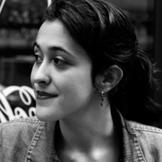Maria Ridao

Arts and Languages
MA Student
École des Hautes Études en Sciences Sociales
Maria Ridao Mestres is a Graduate student at the Sorbonne Nouvelle – Paris 3, in Literature and Theater. She is currently finishing her MA degree in “Arts and Language” at the École des Hautes Études en Sciences Sociales, under the direction of Prof. Pierre Judet de la Combe. She has also been working alongside six other students, with theatre director Thomas Jolly in his production Fantasio by Jacques Offenbach at the Opera Comique in Paris, in a collaboration trying to bridge theoretical research and performing arts, a project which is due to be made a web-documentary and a colloquium at the beginning of 2018.
Since she participated in last year’s Summer Campus and thanks to her stay in Freie Universitaet in Berlin, Maria’s research has taken a different turn. Focusing more in the political and historical reception of Calderón de la Barca’s works and seeing what mosaic was created from such different and sometimes even contradictory purposes, her aim is to somewhat enable the approach she had last year (Theater as a philosophical system) by studying beforehand what has been the author’s fate in critique and different types of literature. Since the late 19th century, Calderón has been a controversial author, for his catholic and monarchic views left to see in his plays: either seen as a nationalist emblem or the effigy of the values that had lead Spain to the decadence it was then experiencing, the critique and the staging he has known since then has partially failed to convey the tremendous complexity and contradictory aspects of the author himself, but also those of the era he composed in, the Golden Age. Reading, studying and understanding these texts and polemics about Calderón was the first step visualizing materially the system of thought he created as a dramatist and powerful thinker, its terms and its questionings.
Maria’s MA thesis has tried to draw a constellation between reception, analysis and interpretation, to, on the one hand, replace and rehabilitate Calderón de la Barca’s work within his time, the different readings he has known and the philosophical traditions his works put into words and on the stage, and on the other, to reflect on this approach itself, the importance of reading and the creative dimension of interpretation.
